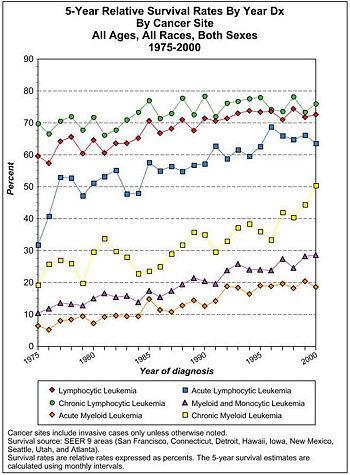B-Cell chronic lymphocytic leukemia
In medicine, B-Cell chronic lymphocytic leukemia, also called chronic lymphocytic leukemia (CLL), is a "chronic leukemia characterized by abnormal B-lymphocytes and often generalized lymphadenopathy. In patients presenting predominately with blood and bone marrow involvement it is called chronic lymphocytic leukemia (CLL); in those predominately with enlarged lymph nodes it is called small lymphocytic lymphoma. These terms represent spectrums of the same disease."[1][2][3]
Prognosis
Staging information
B-Cell chronic lymphocytic leukemia staging information from the National Cancer Institute's Physician Data Query
Treatment
B-Cell chronic lymphocytic leukemia treatment information from the National Cancer Institute's Physician Data Query
As a primary antineoplastic agent, fludarabine may be more effective than chlorambucil.[4]
References
- ↑ Anonymous (2025), B-Cell chronic lymphocytic leukemia (English). Medical Subject Headings. U.S. National Library of Medicine.
- ↑ Shanafelt TD, Byrd JC, Call TG, Zent CS, Kay NE (September 2006). "Narrative review: initial management of newly diagnosed, early-stage chronic lymphocytic leukemia". Ann. Intern. Med. 145 (6): 435–47. PMID 16983131. [e]
- ↑ Chiorazzi N, Rai KR, Ferrarini M (February 2005). "Chronic lymphocytic leukemia". N. Engl. J. Med. 352 (8): 804–15. DOI:10.1056/NEJMra041720. PMID 15728813. Research Blogging.
- ↑ Rai KR, Peterson BL, Appelbaum FR, et al (December 2000). "Fludarabine compared with chlorambucil as primary therapy for chronic lymphocytic leukemia". N. Engl. J. Med. 343 (24): 1750–7. PMID 11114313. [e]
